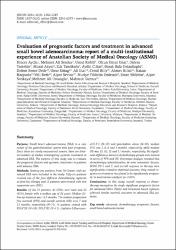Evaluation of prognostic factors and treatment in advanced small bowel adenocarcinoma: report of a multi-institutional experience of anatolian Society of medical oncology (ASMO)

Göster/
Erişim
info:eu-repo/semantics/openAccessTarih
2016Yazar
Aydın, DinçerŞendur, Mehmet Ali
Kefeli, Umut
Ünal, Olçun Umut
Taştekin, Didem
Akyol, Murat
Tanrıkulu, Eda
Çiltaş, Aydin
Ustaalioğlu Bala, Başak
Dede Şener, Didem
Esbağ, Onur
İnal, Ali
Bilir, Cemil
Bilici, Ahmet
Harputlu, Hakan
Berk, Veli
Sevinç, Alper
Özdemir Yıldırım, Nuriye
Yıldırım, Emre
Sonkaya, Alper
Ustaoğlu, Mehmet Ali
Gümüş, Mahmut
Üst veri
Tüm öğe kaydını gösterKünye
Aydın, D., Şendur, M. A., Kefeli, U., Ünal, O. U., Taştekin, D., Akyol, M. ... Gümüş, M. (2016). Evaluation of prognostic factors and treatment in advanced small bowel adenocarcinoma: report of a multi-institutional experience of anatolian Society of medical oncology (ASMO). Journal Of Buon, 21(5), 1242-1249.Özet
Purpose: Small bowel adenocarcinoma (SBA) is a rare tumor of the gastrointestinal system with poor prognosis. Since these are rarely encountered tumors, there are limited numbers of studies investigating systemic treatment in advanced SBA. The purpose of this study was to evaluate the prognostic factors and systemic treatments in patients with advance SBA. Methods: Seventy-one patients from 18 Centers with advanced SBA were included in the study. Fifty-six patients received one of the four different chemotherapy regimens as first-line therapy and 15 patients were treated with best supportive care (BSC). Results: Of the 71 patients, 42 (59%) were male and 29 (41%) female with a median age of 56 years. Median follow-up duration was 14.3 months. The median progression free survival (PFS) and overall survival (OS) were 7 and 13 months, respectively (N=71). In patients treated with FOLFOX (N=18), FOLFIRI (N=11), cisplatin-5-fluoroura-cil/5-FU (N=17) and gemcitabine alone (N=10), median PFS was 7, 8, 8 and 5 months, respectively, while median OS was 15, 16, 15 and 11 months, respectively. No significant differences between chemotherapy groups were noticed in terms of PFS and OS. Univariate analysis revealed that chemotherapy administration, de novo metastatic disease, ECOG PS 0 and 1, and overall response to therapy were significantly related to improved outcome. Only overall response to treatment was found to be significantly prognostic in multivariate analysis (p = 0.001). Conclusions: In this study, overall response to chemotherapy emerged as the single significant prognostic factor for advanced SBAs. Platin and irinotecan based regimens achieved similar survival outcomes in advanced SBA patients.
WoS Q Kategorisi
Q4Scopus Q Kategorisi
Q3Kaynak
Journal Of BuonCilt
21Sayı
5Koleksiyonlar
- Makale Koleksiyonu [3649]
- PubMed İndeksli Yayınlar Koleksiyonu [4047]
- Scopus İndeksli Yayınlar Koleksiyonu [6283]
- WoS İndeksli Yayınlar Koleksiyonu [6432]

















